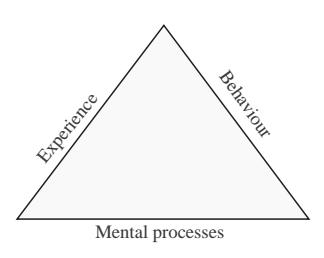Nature and Definition of Psychology
In simple words psychology is a systematic and scientific study of mental processes, experiences and behaviors - both overt and covert. The word ‘psychology’ has its origin in two Greek words ‘psyche’ and ‘logos’. The word ‘psyche’ in Greek language refers to ‘spirit’ or ‘soul’ and the word ‘logos’ refers to ‘discourse’ or ‘study’.
During earlier times, it was considered as a discipline which deals with the study of soul. In India, the study of such questions was the main concern during Vedic and Upanishadic period. Various aspects of mental processes were analyzed. Subsequently the schools of Yoga, Samkhya, Vedant, Nyaya, Buddhism, and Jainism provided detailed accounts of mind, mental processes and methods to control mind.
In modern period it started at Calcutta University in 1916 with establishment of the Department of Psychology. In the western world, the formal beginning of psychology as an independent discipline goes back to 1879 when Wilhelm Wundt established the first experimental laboratory at the University of Leipzig, in Germany. Since then the growth of psychology has covered a long journey.
Today it is one of the very popular subjects among social sciences. It studies all the shades of experiences, mental processes and behaviours. A comprehensive analysis of all these aspects provides a scientific understanding of human nature.

A. Study of experience
Psychologists study a variety of human experiences which are mainly personal or private in nature. They may range from experiences of dream, conscious experiences at different stages of life and experiences when the consciousness is altered through meditation or use of psychedelic drugs. The study of such experiences helps the psychologist to understand the personal world of the individual.
B. Study of mental processes
Psychology as the study of mental processes tries to investigate the activities happening in the brain which are primarily non physiological in nature. These mental processes include perception, learning, remembering and thinking. These are internal mental activities which are not directly observed but inferred from the behavioural activities of the person. For example, we can say that somebody is thinking if he or she displays certain activities related to finding solution to a mathematical problem assigned to him or her.
C. Study of behaviour
The range of behaviours studied in psychology is very broad. It includes simple reflexes (e.g. eye blinking), common response patterns such as talking to friends, verbal reports about feelings and internal states and complex behaviours such as handling computers, playing piano and addressing a crowd. These behaviours are either observed directly through naked eyes or are measured through instruments.
They are generally exhibited verbally or nonverbally (e.g. facial expression) when an individual reacts to a stimulus in a given situation. Thus, in psychology the main unit of investigation is the individual human being and his or her experiences, mental processes and behaviours.